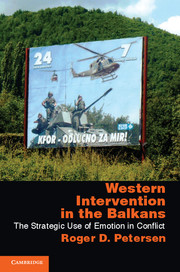Book contents
- Frontmatter
- Contents
- Acknowledgments
- Part 1 Background and Theory
- Part 2 Cases and Tests
- 7 Background to Western Intervention in the Balkans
- 8 The Case of the Roma in Kosovo
- 9 Background to Kosovo
- 10 Waiting for the West
- 11 Kosovo Intervention Games, I
- 12 Kosovo Intervention Games, II
- 13 Kosovo Conclusions
- 14 South Serbia
- 15 Macedonia
- 16 Bosnia
- 17 Montenegro
- 18 Conclusion
- Appendix A A Note on Names
- Appendix B Alternative Arguments
- References
- Index
- References
11 - Kosovo Intervention Games, I
from Part 2 - Cases and Tests
Published online by Cambridge University Press: 05 June 2012
- Frontmatter
- Contents
- Acknowledgments
- Part 1 Background and Theory
- Part 2 Cases and Tests
- 7 Background to Western Intervention in the Balkans
- 8 The Case of the Roma in Kosovo
- 9 Background to Kosovo
- 10 Waiting for the West
- 11 Kosovo Intervention Games, I
- 12 Kosovo Intervention Games, II
- 13 Kosovo Conclusions
- 14 South Serbia
- 15 Macedonia
- 16 Bosnia
- 17 Montenegro
- 18 Conclusion
- Appendix A A Note on Names
- Appendix B Alternative Arguments
- References
- Index
- References
Summary
Chapter 4 outlined intervention games and identified a common sequencing of games. First, the intervener ends the chaos represented by the N-person assurance game. In further steps, the intervener transforms a prisoners’ dilemma through manipulation of rewards and punishments and moves players to a stable era of mutual cooperation. As of June 1999, the UN, with a dominant Western influence, began playing these games in Kosovo. They did not get off to a smooth start. Then things got worse. The present chapter explains why, step by step.
The n-person assurance game and hatred (r9)
In the beginning stage, the incoming regime attempts to establish itself as the legitimate authority by persuading individuals to move away from nonstate self-defense groups and into compliance with the new state and state-sanctioned organizations. To review the fourth chapter, the incoming intervention government must assure individuals that it is indeed the legitimate authority and that it will be able to provide security to those who cooperate with it. If individuals perceive the incoming regime as stable, they will raise their estimates of the value of cooperation. In effect, a “tipping point” is lowered and, if individuals see other members of their reference group crossing over into cooperation with the intervener, they will also decide to move from defection to cooperation.
- Type
- Chapter
- Information
- Western Intervention in the BalkansThe Strategic Use of Emotion in Conflict, pp. 164 - 183Publisher: Cambridge University PressPrint publication year: 2011

